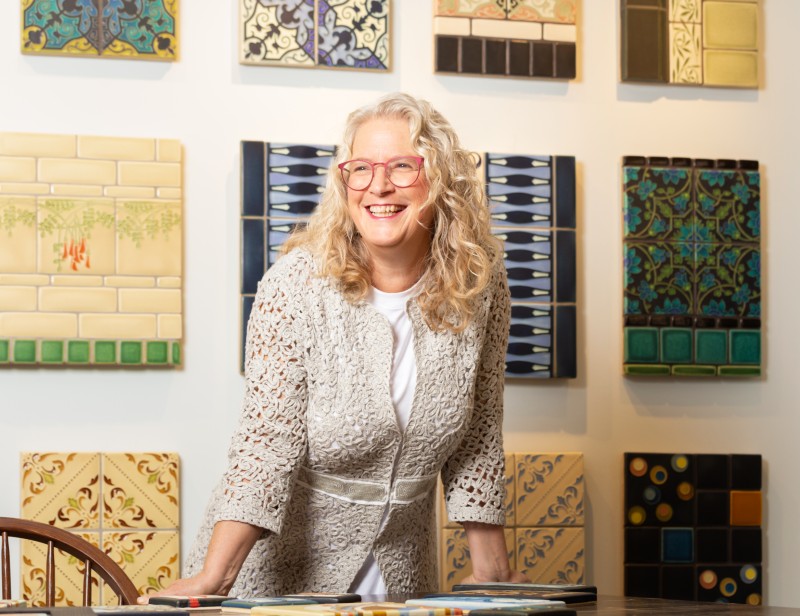Nawal Motawi's strong will and fierce individuality fire her acclaimed art-tiles studio in Ann Arbor

It took about a year and a half before Nawal Motawi dropped out of art school.
“I was really disgusted with what it looked like,” she says.
Motawi, who founded the renowned Motawi Tileworks in 1992, was enrolled at the Penny Stamps School of Art and Design at the University of Michigan. Abstract expressionism was in vogue and the emphasis in classes was less on how well each piece of art was made, Motawi says, than on how intricately they could be interpreted.
“What I felt like I learned in art school was that, basically, if you could tell a good story, then [your work] was [considered] good,” she says.
The Ann Arbor-based Motawi Tileworks, where Nawal Motawi continues to serve as owner and artistic director, recently celebrated its 30th anniversary. To honor the occasion, the retrospective exhibit Motawi Tileworks: A Celebration of 30 Years is on display at the Rogel Cancer Center at the University of Michigan Hospital until December 23.
Motawi’s impatience with some of its more voluble aspects of art school came to a head after a particular sculpture class.
Fables of the Deconstruction: Allison Epstein’s second novel uses Eastern European mythology to create queer historical fiction

Allison Epstein says Let the Dead Bury the Dead is “my COVID novel, for sure."
She started writing it in 2019 and "most of the drafting and rewriting happened while I was in lockdown, looking for something to do.”
The book is set in 1812 in a partially reimagined St. Petersburg, Russia, where a band of revolutionaries, the Koalitsiya (loosely based on the Decembrists), plot against the tsar, while the tsar’s second son decides whether or not to join them.
The Chicago-based Epstein, who earned her Bachelor of Arts in creative writing from the University of Michigan, also wrote historical fiction in her first novel, A Tip for the Hangman, based on the 16th-century life of playwright and alleged spy Christopher Marlowe.
Epstein says the inspiration for Let the Dead Bury the Dead came from another book set in the same period and country.
"'I have a crisis for you': Women Artists of Ukraine Respond to War" acts as an archive of witness and response

"I have a crisis for you": Women Artists of Ukraine Respond to War was first shown at the University of Michigan's Lane Hall Exhibit Space last August 25 through December 16, and it was brought to U-M's Weiser Hall from January 3 through February 23.
And the curators don't think the exhibition is complete.
“I can’t say it's a finished project, because it will have afterlives,” said co-curator Jessica Zychowicz, director of the U.S. Fulbright Program in Ukraine, who also earned her Ph.D. from U-M.
She and co-curator Grace Mahoney—a Ph.D. candidate in Slavic languages and literatures, and a graduate fellow for exhibits at the Institute for Research on Women and Gender at U-M—hope the multimedia exhibit keeps finding new venues beyond Ann Arbor and can serve as an educational tool, or at least serve as an archive of work in which women describe and respond to their own particular experiences of war.
"I have a crisis for you" features paintings, writing, photos, and more by:
- visual artist and sculptor Kinder Album
- photographer J.T. Blatty
- visual artist and U-M grad student Oksana Briukhovetska
- visual artist and designer Sonya Hukaylo
- filmmaker, artist, and performer Oksana Kazmina
- visual artist Lesia Kulchynska
- poet and translator Svetlana Lavochkina
- visual artist Kateryna Lisovenko
- poet and screenwriter Lyuba Yakimchuk
Zychowicz and Mahoney did their curation remotely: Mahoney from Ann Arbor; Zychowicz from Warsaw, Poland, where she moved from Kyiv when the invasion began. To inform the project, the curators drew on previous relationships they had with the artists and writers as well as their own scholarship: Zychowicz is the author of Superfluous Women: Art, Feminism, and Revolution in Twenty-First Century Ukraine, and Mahoney is the series editor of Lost Horse Press' Contemporary Ukrainian Poetry Series.
Zychowicz and Mahoney recently talked with me over Zoom to discuss the exhibit. Our conversation was edited for clarity and length.
(Re)Introducing Djangophonique: Andrew Brown and Co. are putting a modern spin on a jazz tradition

“When I say ‘modern music,’” says Andrew Brown, “what I mean is, like, anything after 1956.”
Brown is the band leader and lead guitarist for Djangophonique, the crisp Ann Arbor-based quartet that’s made a name for itself reveling in—and updating—the 1930s and 1940s music known as “gypsy jazz,” or jazz manouche. It's a sound primarily associated with the French-Romani guitarist Django Reinhardt, but Djangophonique applies the style to a range of genres, from country music to swing.
In 2020, Djangophonique released a live EP, Jazz Du Jour, some of which was recorded at the Blue Llama Jazz Club, but it came out just before the pandemic began. “That kind of put things on pause for a while,” Brown says.
But the band regrouped and last summer issued its first full-length album, Introducing Djangophonique, which garnered the quartet more and more attention. The group snagged some high-profile gigs, too, including the bluegrass-based Wheatland Music Festival, the Detroit Jazz Festival, and Ann Arbor's Top of the Park. While Djangophonique performs all over the area, its current home base is Ann Arbor's new North Star Lounge, where Brown is the creative director and the group has a residency most Wednesdays.
Harmoniously Happy: Brandi Carlile at the Michigan Theater

Nobody sings like Brandi Carlile.
Her voice has so much power and force it’s like something shot out of a cannon -- except that there’s subtlety there, too, and nuance, and many different shades of feeling.
At her June 9 show at the Michigan Theater show, co-hosted by The Ark, Carlile played to an ecstatic, sold-out audience, showcasing the power of her voice and the force of her backing band.
From her first album (Brandi Carlile) to her most recent (By the Way, I Forgive You), Carlile’s songs have reckoned with late nights, stiff drinks, and love affairs gone wrong -- or, occasionally, right. But in Ann Arbor, Carlile explored a different side of herself, a more grown-up side. If there was a theme to the show, it was parenthood.
Culottes, Canes & "Calypso": David Sedaris at Literati

David Sedaris was his usual charming, generous self when gave a packed reading on Friday at Literati Bookstore in Ann Arbor in support of his new book of essays, Calypso. And, of course, he was hilarious, telling dirty jokes, cursing, and plotting revenge on his West Sussex neighbors.
In Calypso, Sedaris has returned to the humorous essay form with which he’s made his reputation. His siblings, parents, and boyfriend, Hugh -- familiar to long-time readers -- appear once again. But many of these essays are darker in subject and tone than Sedaris’s previous work. They describe aging, illness, and the unexpected death of his sister, among other things. In the book’s first sentence, Sedaris announces, “Though there’s an industry built on telling you otherwise, there are few real joys to middle age.”
Sedaris didn’t read that essay on Friday, but he did read the text of a commencement speech he recently gave at Oberlin College, which touched on similar themes. Encouraging young writers to pursue their vocation (at any cost), he said, “At 22 you are built for poverty and rejection. And you know why? Because you are so good looking.” He also said: “Be yourself. Unless your self is an asshole.”


































